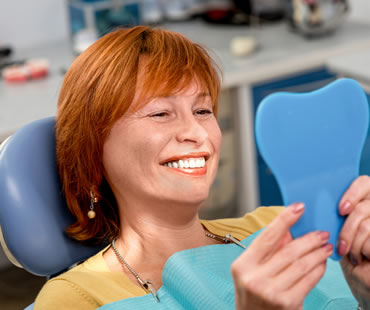
by Dr. Adkins | Apr 22, 2022 | Blog, Cosmetic Dentistry, Dental Topics 1
Dentistry today does not just include treatments for tooth and gum problems or diseases. The trend in dentistry has expanded to include a wide range of treatments and procedures with the purpose of improving your appearance. The purpose of cosmetic dentistry is to give you the most appealing smile possible so that you can be happy with your look and have an improved self-esteem. Here are some trends in cosmetic dentistry explained.
Bonding
Mild to severely damaged teeth can be treated with dental bonding. A tooth-colored material is applied to the fractured or chipped surface of your tooth and then bonded with a special light. The restoration provides a renewed look to your tooth so that others can’t even tell it was ever damaged.
Teeth whitening
A bright white smile gives of a great impression of oral health and beauty. Stains from age, foods, drinks, and habits like smoking all play a role in making your smile dull and unattractive. Cosmetic dentists offer teeth whitening procedures that can turn your smile around in just an hour.
Veneers
Another way to easily improve your smile is dental veneers. These thin shells usually made of porcelain are permanently adhered to the fronts of your teeth, giving you a bright and flawless smile for many years to come.
Contouring
Instead of having lengthy orthodontic treatment to correct crooked teeth or uneven spacing, contouring is an option to improve your look. Also called tooth reshaping, this procedure is additionally used to correct irregularly shaped teeth and alter issues like overly pointy teeth. During contouring, small amounts of tooth enamel are removed in order to change the tooth’s shape, length, or surface.
Implants and dentures
To replace missing teeth, dental implants are dentures are both options depending on the patient and the specific situation. Many people prefer implants because they are a permanent and secure solution.
Cosmetic dentist in McDonough

by Dr. Adkins | Apr 15, 2022 | Blog, Dental Topics 1, General Dentistry
Most dentists recommend that patients replace their toothbrushes every three to four months. About this time, the bristles start to wear out or become frayed, which makes the tool less effective. You should also replace your toothbrush right away if you have been sick so that you don’t re-infect yourself.
Once you are done with the toothbrush, you don’t have to immediately toss it in the trash. These creative opportunities will allow you to put that old toothbrush to good use.
Dust the keyboard
The precision of the bristles makes it a cinch to get between the keys.
Eliminate stains
If you get spots on your carpet or upholstery, an old toothbrush will enable you to really scrub the soiled area and remove the stain.
Touch up your roots
For those who dye their own hair, an old toothbrush is the perfect tool for applying color to specific areas.
Dislodge dirt from under your nails
Gardening will help your plants grow, but will also make your manicure look less than appealing. With an old toothbrush, you can say good-bye to grimy nails.
Polish jewelry
To make your favorite pieces sparkle, use an old toothbrush and a tab of toothpaste to restore their beauty.
Clean bike chains
If you don’t want to look like a mechanic after taking grease off the chains, you can grab an old toothbrush and easily finish the job.
Remove silk strings off ears of corn
Before boiling corn, wipe the ears with an old toothbrush to eliminate the corn silk and keep it out of your teeth.
We look forward to seeing you in our McDonough dental office

by Dr. Adkins | Apr 8, 2022 | Blog, Dental Topics 2, Family Dentistry
The area of dentistry that provides preventative and restorative treatment for oral health needs for the whole family is called family dentistry. These types of dental practices deal with all age groups using a wide variety of treatment options.
Although similar to general dentistry, family dentistry does not restrict the practice to specific age groups. It addresses oral health issues at every stage of life, from baby teeth to permanent teeth. Children should begin regularly seeing a dentist around turning one year old, so what better way to start your child’s professional dental care by establishing care with the same dentist that the whole family sees? It is convenient to have everyone seeing the same dentist, and you can establish a long-lasting healthcare relationship for all of you.
One of the most important aspects of family dentistry is ongoing, consistent maintenance and preventative treatment. Experts recommend getting a dental checkup every six months for deep cleanings and routine examinations. This helps eliminate plaque buildup, a primary cause of tooth decay and cavities, and identifies any oral health issues that might be occurring even before symptoms develop.
Fluoride treatments are offered by most family dentists. This involves coating the teeth with fluoride to help prevent tooth decay. Dental sealants are another line of defense against dental issues that family dentists can provide. Other services that some family dentists offer include cavity filling, gum disease treatment, crowns, root canals, extractions, and orthodontics. Treatments offered completely depends on the family dentist and the associated practice. Make sure you ask questions and learn all about the practice before choosing a family dentist for your own family’s needs.
We treat patients from McDonough and the surrounding area

by Dr. Adkins | Apr 1, 2022 | Blog, Dental Topics 1, Implant Dentistry
When you don’t have a full smile, your self-esteem and oral health decline. Implant restorations offer a solid solution for patients who have lost teeth. Designed to look and feel like your natural teeth, dental implants will rejuvenate an incomplete smile. Dental implants allow you to eat the foods you love, speak clearly, and laugh with confidence.
Constructed from biocompatible titanium, a dental implant is a small metal post surgically inserted into your jaw bone. The implant creates an artificial tooth root. Eventually, a permanent crown is placed on the post, restoring the function and appearance of your smile.
Although you can replace missing teeth with dentures or crown and bridgework, dental implants offer several advantages, including:
• Durability
• Longevity
• Natural Appearance
• Stability
Before suggesting dental implants, your dentist will evaluate your mouth and oral health to make sure you are a good candidate for implants. If you don’t have sufficient bone structure to support the implants, your dentist may suggest a bone graft. In most cases, dental implants have a 95 to 98 percent success rate.
With implant therapy, an oral surgeon or prosthodontist will position one metal post in each empty socket. Implants can replace one or more missing teeth. Once your mouth heals and bone fuses with the biocompatible post, your dentist will attach a lifelike prosthetic crown. Care for the implants as you would your natural teeth, brushing twice daily, flossing frequently, and visiting the dentist for routine checkups.
Dental implants dentist in McDonough

by Dr. Adkins | Mar 25, 2022 | Blog, Dental Topics 2, Family Dentistry
When you’re talking about the oral health of yourself and your family, there is no excuse for neglecting regular dental care. There are various kinds of dentists and specialists, but if you need general dental treatment, a family dentist is a great choice.
Family dentists treat common dental problems and provide maintenance care. Visiting a family dentist is the first line of defense against oral health problems. In addition to regular checkups and cleanings, you will learn preventative techniques to help you avoid issues. If the dentist diagnoses a problem and you need further treatment, a specialist in that area may be recommended to provide additional specialized care.
It is important to find the right family dentist for your needs. Look for advertisements for dentists in your area, and ask friends and family for recommendations. Visit the dental office before finalizing your selection so that you can meet the staff, see the facility and equipment, and learn more about the practice. You should feel comfortable and confident in the office policies and staff, since you are likely establishing a healthcare relationship to last for years.
Also ask about the dentist’s qualifications and experience. Make sure that the services you are interested in are offered, and that the dentist works with specialists to get you the proper treatment for those that are not offered. It is ideal to visit the dentist for minor treatment such as a professional cleaning before switching the whole family to the practice. That way you can see first-hand if the dentist meets your expectations. You may also want to schedule an appointment for your children to ensure the whole family is comfortable.
Once you and your family are confident that the family dentist is right for all of you, switch everyone to the practice and then follow up on regular dental care for the whole family.
If you need a dentist in McDonough contact us today

by Dr. Adkins | Mar 18, 2022 | Blog, Dental Topics 2, Implant Dentistry
Many patients seeking the stability and durability of dental implants wonder what the difference is between mini implants or standard sized dental implants. The basic differences are with regard to their intended function.
A standard dental implant is larger than 3 millimeters in diameter and is made up of two parts: the screw and the abutment. The screw portion of a dental implant is made of titanium, a non-toxic metal well tolerated by the body. The success of all dental implants is due to this bio-compatibility. Materials that aren’t tolerated by the body can create a response by the immune system and may lead to serious problems over time.
With a standard implant, the screw has two threaded areas: external, to screw into the bone and internal, to accommodate any components that are screwed into the implant for security. This internal area provides for the abutment. It is on this abutment that the tooth portion of a dental implant is attached. It also holds dentures firmly in place.
A mini dental implant is smaller than 3 millimeters in diameter and has one solid piece instead of screw and abutment. A mini implant has a solid screw body with a rounded ball shape that extends out of the jawbone. This rounded ball can hold a denture with a corresponding slot, keeping the restoration firmly in place.
Because they are smaller, mini implants provide less support than a standard implant. For example, four mini implants would be needed to hold a patient’s lower dentures in place securely. For the same job, only two standard sized implants would suffice.
Consult your dentist to determine if mini implants or standard implants are right to address your missing tooth or teeth. Get the right implant for your specific needs.
We treat patients from McDonough and the surrounding area








 (470) 665-5292
(470) 665-5292  E-Mail Us
E-Mail Us 
